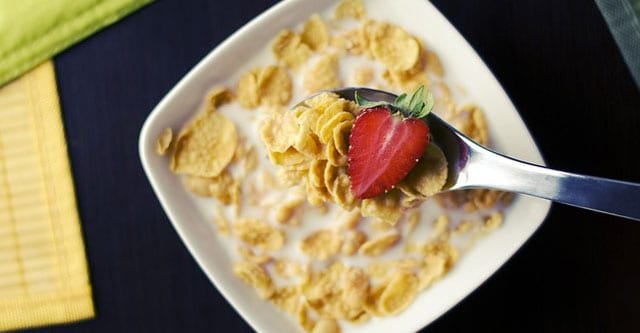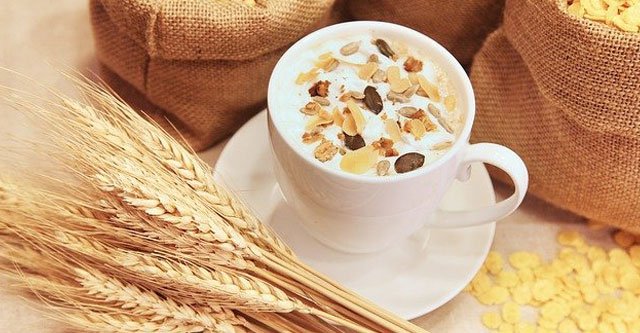Last Updated on May 4, 2023 by Dr Sharon Baisil MD
Cereals are among the most easiest and common breakfast and snack foods. Coming to cereals, a quick bowl of corn flakes is the most famous.
But is this quick-fix snack and breakfast milk cereal safe for diabetics?
We will tell you all that you should know before including or continuing the consumption of corn flakes in your everyday diet. Can diabetics eat corn flakes?
Let us begin with this intimidating question.
Can diabetics eat corn flakes?

Well, a very straightforward answer to this question is – Not really. Corn flakes are rather cereals that one should avoid as diabetic patients. They can cause some serious harms and fluctuations in the blood sugar levels if taken regularly and without moderations.
They have an estimated Glycemic Index of around 83 to 93. The Glycemic Load is approximately around 23.
The added sweeteners and artificial sugars increase the cumulative carbohydrate present in this cereal. Manufacturing and processing also add more unhealthy elements.
Corn flakes can be harmful to those who have diabetics. They can cause high levels of blood sugar in the body if its intake is not controlled.
Many varieties of this cereal are available in the market. Generally, all of these brands offer flavored, sweetened, and high-carb varieties. Thus, Corn flakes are on the higher side of the Glycemic Index.
These cereals are generally high in carbohydrates as carbs provide immediate energy. Breakfast is expected to supply one with needed morning energy.
The Glycemic Index of foods that are above 70, fall under a category oh High Glycemic Index. They have more carbohydrates. They can produce extreme and unsafe fluctuations in diabetes levels.
Also, foods that have a Glycemic Load over 20 are said to cause spikes in sugar levels. They fall out of the safe category of foods for diabetics.
The cereals such as corn flakes are made to satisfy your sugar temptation. It is not made of the best raw materials as well.
Corn flakes are made of refined grains and sugar. These ingredients are not the best ones or even recommended for diabetics. These add up to make an empty calorie snack item that lacks healthy nutrients.
Breakfast is one of the most essential meals for a diabetic patient. Starting the day healthy and maintaining it is a very important step. Including regular corn flakes is not the best way to manage your diabetic health.
Let’s know some more:
Corn flakes, Diabetics, and Breakfast

Among all the various cereals, corn flakes are known to be one of the famous ones. They are even considered to be healthy. But is this quick and simple breakfast cereal really healthy?
A good cereal must be high in fiber. Fiber is a necessary nutrient for diabetic patients. Corn flakes have only over 3 grams of fiber in the total, which is not enough to qualify as a good cereal.
It also has a lot of added sugar in various forms that increase the net carbohydrates. It also contains a good amount of sodium. The sodium content in cereals can also be harmful to the body.
The high Glycemic Load as well as Glycemic Index anyway denotes that it is not suitable for one’s diabetic diet. The calories add to glucose and affect diabetic.
The very basic ingredient of corn flakes, as the name suggests, is corn. These are among the many genetically modified crops. While the manufacturing process, the corn is stripped off of its healthy nutrients and only left with the carbohydrates.
Due to this reason, corn flakes can cause sudden rises in blood sugar levels. You will be able to notice the bad effects on your body after checking your blood sugar levels.
Consuming corn flakes for diabetic patients can reduce the functioning of insulin in the body. This creates a rapidly higher blood sugar level.
All of the above-mentioned reasons also make corn flakes unhealthy for weight loss. As diabetics, it is very crucial to have a check on your overall weight. A bowl of this cereal will add to your weight and cause problems for diabetics, pre-diabetics, dieters, etc.
Following is a table showing the amounts of basic nutrients found in corn flakes:
| Sl. No. | Nutrients in 100grams of corn flakes | Nutritional information |
| 1. | Energy | 378kcal |
| 2. | Carbohydrates | 84g |
| 3. | Protein | 7g |
| 4. | Fat | 0.9g |
| 5. | Fiber | 3.3g |
| 6. | Iron | 8mg |
| 7. | Salt | 1.12g |
In the above table, the 8 grams of the carbohydrates are directly from sugars. It is more than the recommended 6 grams of sugar allowance for healthy and diabetic-friendly cereals.
The less protein also makes it unfit for making one stay full for long. It does not satisfy nutritional requirements. It is light but unhealthy.
The high amounts of carbs and low fiber-content make it easy for the sugar levels to rise. Therefore, all in all, corn flakes are not recommended cereals for diabetics.
Daily limits for eating corn flakes, if you have Diabetes

By now, we have discussed that corn flakes are not recommended for regular consumption as cereals. It is topped with carbohydrates, malt, fructose, rich corn syrups, sugars, etc.
The high values of the Glycemic Index also indicate they are not fit for daily consumption, especially, by diabetic patients.
But if the corn flakes are a convenient breakfast option for you, then you can opt for better recipes that help to make it healthy.
Some tips to make it healthy:
- Go for lesser flakes and more fiber. Moderate your corn flakes serving size between 30 grams to 40 grams (1 – 1 ¼ cup) for adults and up to 25 grams for kids (1 cup). Reduce your everyday cereal serving and fill the rest with healthy fruits.
- Choose the corn flakes that do not have extra sugars. Opt for uncoated options to be on the safer side. Stay away from flavored flakes.
- You can add in more fibers and minimize the number of fats and sugars. This is a way to make this easy cereal healthy for everyday consumption.
- Add in fruits such as bananas, berries, apples, etc. that are recommended for diabetics into your bowl of corn flakes. In this way, you can add -, fibers, and vitamins.
- Adding fruits also makes the cereal sweet. This helps to cut down on adding more sugar or honey to your regular cereal bowl. Avoid putting sugar or sweet syrups in corn flakes.
- You may even add in some nuts – almonds, walnuts, etc. This adds nutritional goodness to the otherwise empty calorie food.
- You can also replace your daily cereal milk with healthier slimmer milk varieties. Opting for skimmed milk, oat milk, etc. can be beneficial to your diabetic health.
- Another way is to mix your corn flakes with 50% wheat or oat flakes. This is extremely judicious as a breakfast choice. It is healthy for your diabetic health and blood sugar levels.
- When choosing to go for a bowl of corn flakes in the morning, make sure you do not consume other snacks or meals that can be bad for your diabetic levels.
- Change to other healthy breakfast options over corn flakes. Try to limit its intake to not more than twice or thrice a week.
Always remember to monitor your blood glucose reactions. Take your medications on time and consult your doctor for the best choices and healthier options.
Benefits of eating corn flakes

Well, with all the above-mentioned tips in mind, you can turn the everyday bowl of cereals beneficial. Make sure you follow the limits and restrictions to avail of the benefits. Here are some potential benefits of having corn flakes:
- This is low in fat. The calories in corn flakes are added by carbs and not fats. Thus, it has a lower fat content.
- It can provide the body with iron. Iron is a very necessary element for diabetics. Corn flakes have potential iron content that can have advantages on the health.
- The addition of milk, fruits, and nuts in corn flakes makes it higher in protein. Protein is good for the body and also promotes healthy digestion. Make sure to enhance the corn flakes with some added fruits and nuts.
- Corn flakes are rich in some vitamins. These vitamins such as – Vitamin B-6, Vitamin B-2, Vitamin B-1, Vitamin A, D, etc. are great additions.
- Thiamine is present in corn flakes. It can be good for various bodily systems and functions. It also encourages better carbohydrate metabolism.
- As corn flakes are low in fat, thus, they are healthy for the heart as well.
- Corns are said to contain Carotenoid. This is a useful nutrient to keep the lungs healthy and efficiently functional.
Healthy Cereal Alternatives for Cornflakes
Replacing your everyday sugar, high in carbohydrate cereal is the perfect way to change your diet according to your diabetic health.
Many available cereal options top the list before corn flakes. They are better for diabetics and have minimal effects on one’s blood glucose levels.
Here are some cereals you can go for:
Oatmeal Cereal

Oats are amazing foods to be included in one’s diet. Diabetics can have special benefits from all the fiber goodness of oats.
– They improve in managing blood sugar levels and are low in GI. It also has many other benefits such as – rich in anti-oxidants, promotes weight loss, promotes healthy digestion, etc.
Muesli

– Muesli is also included with oats. It has the oat-fiber known as beta-glucan which reduces cholesterol.
– It is good for the management of heart-health, as well as diabetes.
Wheat Flakes
– Wheat is a whole grain that is good for diabetic consumption. It has necessary fibers and improves digestive health, controls sugar levels, etc.
– Wheat varieties of flakes are not as factory-refined as corn flakes, thus they have more nutrients.
All-Bran Cereal
- Bran rich cereals are better than the traditional corn flakes.
- They are richer in fiber and have fewer numbers of carbohydrates.
- Bran flakes are also made to have fewer sugars that affect blood sugar levels.
Let us have a look at the GI and GL of these above-mentioned healthy alternative cereals:
| Cereal Type | Glycemic Index | Glycemic Load |
| Oatmeal | 55 | 13 |
| Muesli | 66 | 16 |
| Wheat flakes | 55 | 12 |
| All-Bran cereal | 60 | 12 |
Takeaway
We have learned that corn flakes aren’t the best choice for every day cereals, especially for diabetic individuals. Their ingredients– sugars, malt, corn syrups, etc. are all high in carbs. The overall calorie and carb-content are unsafe for diabetic consumption.
It is better to mix corn flakes with other healthier cereals and add in fruits and nuts. This makes the cereal less carbohydrate-rich and balances other nutrients.
Consumption of corn flakes must be limited and restricted to lower quantities and less frequently. They can also be exchanged by healthier alternative cereals such as oats, muesli, etc.
REFRENCES:
https://pubmed.ncbi.nlm.nih.gov/1563329/
https://pubmed.ncbi.nlm.nih.gov/12077724/
https://pubmed.ncbi.nlm.nih.gov/1468273/
https://pubmed.ncbi.nlm.nih.gov/10919939/
https://pubmed.ncbi.nlm.nih.gov/25458669/
https://pubmed.ncbi.nlm.nih.gov/3556106/
https://pubmed.ncbi.nlm.nih.gov/26101624/
https://pubmed.ncbi.nlm.nih.gov/27843253/
https://pubmed.ncbi.nlm.nih.gov/11304032/
https://pubmed.ncbi.nlm.nih.gov/1563329/
https://pubmed.ncbi.nlm.nih.gov/28714768/
https://pubmed.ncbi.nlm.nih.gov/11595257/





